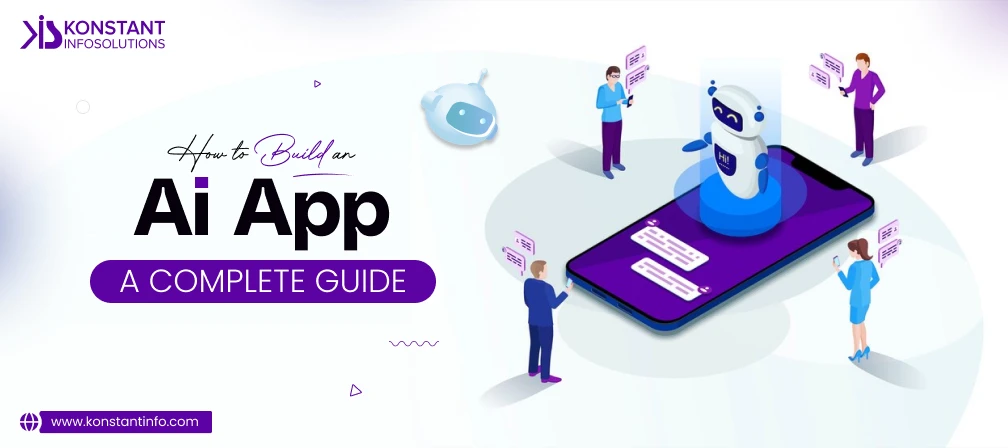
Table of Contents
Generative AI market size to touch $1.3 Trillion mark by 2032 at 42% CAGR
The demand for AI apps is unprecedentedly high and expect to grow in the coming decades. The tech came out to be transformative for several industries and is helping businesses boost their revenue & reduce costs. Further, more apps are expected in the future and the people who can counter the correct problem and build an AI app around it are sure to be successful. However, a lot of doubt still persists in the market around how to build an AI app.
In this article, today, we will deep dive into the process of AI app development and the topics surrounding it. It includes what is AI, benefits of AI for a business, top industries benefiting from AI, top AI apps in the market, and AI app development cost.
In the most layman language, a computer system that can be taught to carry out tasks that normally require human intelligence is known as artificial intelligence. It uses algorithms that simulate how the human brain works to learn and solve problems. There are uses for artificial intelligence in a variety of industries, including commerce, law, academics, and medical.
Deep learning and natural language processing are essential for the majority of AI applications. These technologies enable computers to process vast amounts of data and spot patterns, which allow them to carry out specialized jobs.
| Quick Question – Can Machines Think? Short Answer – Yes – Alan Turing, 1950 |
AI Market Overview
According to Bloomberg, Generative AI was valued $40 Billion in 2022 but is expected to be valued over $1.3 Trillion by 2032
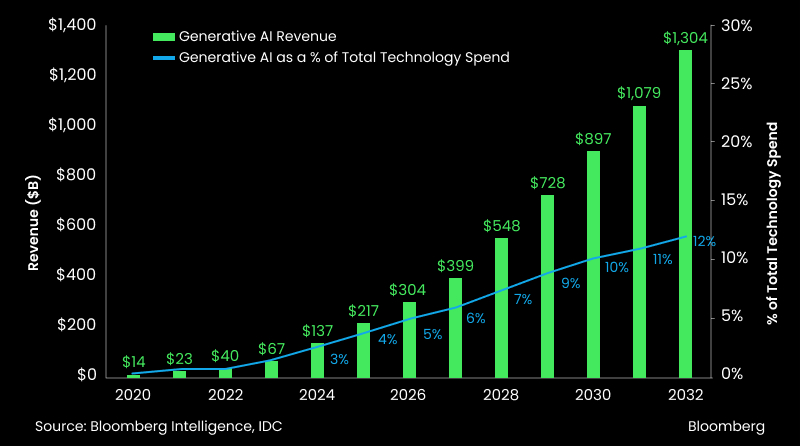
The rising demand for AI products is unprecedented and the trend is expected to add approximately $280 billion to the world economy through software revenue. Major companies like Microsoft, Google, Facebook, AWS, and Nvidia have also jumped into this race. The tech will influence every major industry globally using advances in deep learning algorithms and data driven tools. Regionally, North America is the most dominant player currently but Asia Pacific is expected to grow at the fasted rate.

Artificial Intelligence works on pre determined algorithm and patterns and, unlike humans, doesn’t deviate from the given prompt. As a result, the accuracy of the task is highly increased and the chances of errors are minimized for the given task. Further, the remaining mistakes can be eliminated through corrective measures.
The adoption of robotic surgery systems, which can carry out difficult procedures with accuracy and precision, lowers the chance of human error and improves patient safety in healthcare. This is an example of how AI can reduce human error.
When making decisions, humans tend to rely on instincts, intuitions, and quick cuts. This frequently leads to mistakes, mental biases, and less-than-ideal results. AI improves the human brain by providing data- or prediction-driven insights. It also provides suggestions.
Artificial intelligence (AI) examines difficult problems with awareness and precision, revealing details that a human would miss. Robust insights derived from AI’s robust analysis facilitate better decision-making across a range of business areas, including risk management, optimal resource allocation, and sales forecasting.
An illustration of this would be chatbots for online customer service, which may offer consumers immediate assistance from any location at any time. Chatbots can provide professional customer support around-the-clock by using artificial intelligence (AI) and natural language processing to respond to frequently asked questions, handle difficulties, and refer complicated issues to human agents.
Automating boring, repetitive jobs is one of AI’s greatest advantages for businesses. Artificially intelligent online representatives and automated software robots make it feasible to process streamlined operations around-the-clock.
Automation frees up time so that employees may focus on creative tasks and work more productively. AI chatbots can interact with clients to take orders, provide tech support, and respond to often asked queries.
Virtual assistants are capable of scheduling events, booking travel, keeping track of paperwork, and performing other standard administrative duties. Among many other applications, robotic process automation (RPA) mimics human actions to automate manual data entry, processing, and reporting procedures!
Massive amounts of structured and unstructured data may be processed rapidly and efficiently by AI utilizing computer learning algorithms that can identify patterns, trends, and predictors more quickly than people could.
With the aid of AI analytics, business managers can identify fraud more quickly, cut risks, estimate demand more precisely, and make well-informed decisions more quickly.
They can also better understand the needs of their customers. Quick real-time insight is provided by artificial intelligence (AI) through supply chain information, online traffic sensors, and consumer specifics including sales and financial data!
Businesses may now offer customers smoother, proactive, and personalized experiences thanks to artificial intelligence. Chatbots use natural language processing (NLP) to engage users in dialogue. Product recommendations and tailored information are presented by recommendation engines.
Voice-enabled virtual assistants use voice interfaces to manage client requests in a flexible manner. Brands may better understand consumer sentiment toward their products and quickly resolve concerns by using sentiment analysis of client comments. Increased customer satisfaction is directly correlated with hyper-personalization enabled by AI.

Innovations in AI have primarily benefited the healthcare sector. Artificial intelligence (AI) has been instrumental in updating medical practices, from improving patient care to optimizing administrative tasks. Rapid processing of enormous volumes of patient data enables better informed decision-making, which improves patient outcomes and streamlines healthcare systems.
With its enormous data sets, the finance industry has used artificial intelligence (AI) to improve customer service, decision-making, and security. Automating repetitive operations, forecasting market trends, and providing clients with individualized financial advice have all been made possible by technology.
| According to Accenture, AI is anticipated to generate about $1 Billion within next years in BFSI sector. |
Giants in e-commerce have led the way in the deployment of AI. Understanding customer behavior, streamlining supply chains, and customizing shopping experiences have all benefited greatly from technology. The predictive powers of AI also assist e-commerce platforms in foreseeing changes in the industry and making appropriate adjustments.
AI has been used by the entertainment sector, particularly streaming services, to better understand consumer preferences. More individualized content recommendations have resulted from this, guaranteeing that viewers will always find something entertaining to watch or listen to. AI has also made the processes involved in producing and distributing content easier.
The foundation of the logistics and transportation sectors is efficiency. Route optimization, maintenance demand forecasting, and general operational efficiency have all benefited from artificial intelligence. The development of autonomous cars, which hold the potential to completely transform the transportation industry, has also been aided by technology.
The use of AI by the real estate sector has improved market trends and increased transparency in the purchasing and selling of real estate. Additionally, the technology has been utilized to improve virtual property tours, increasing potential buyers’ accessibility and convenience when seeing properties.
| Top AI Apps | Downloads | Rating | Platform |
|---|---|---|---|
| ChatGPT | 50M+ | 4.8 | Android | iOS |
| Replika | 10M+ | 4.3 | Android | iOS |
| Bing | 50M+ | 4.3 | Android | iOS |
| FaceApp | 500M+ | 4.4 | Android | iOS |
| Otter | 1M+ | 4.3 | Android | iOS |
| Duolingo | 500M+ | 4.5 | Android | iOS |
| Be My Eyes | 1M+ | 4.4 | Android | iOS |
| Grammarly | 10M+ | 4.1 | Android | iOS |
| Lensa AI | 10M+ | 4.4 | Android | iOS |
| Youper-CBT Counseling | 1M+ | 4.1 | Android | iOS |

OpenAI’s ChatGPT is a conversational AI that facilitates in-depth and well-reasoned conversations between users. With its extensive information base, it is meant to entertain as well as help with research and answer inquiries.
| Did you know – ChatGPT witnessed about 1.63 billion user visits in Feb 2024. |

You can communicate with your AI friend at any moment using this app. It changes over time, takes notes from your talks, and offers a secure forum for people to air their grievances.
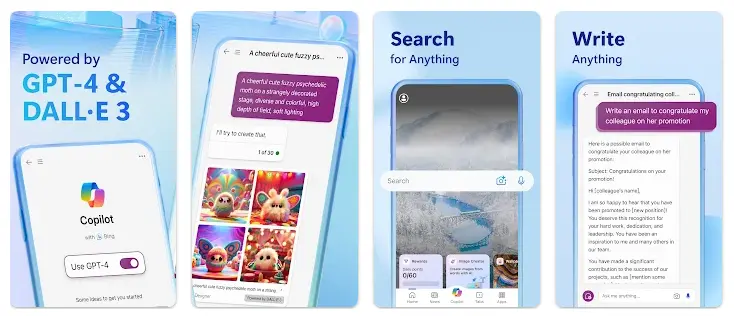
Using artificial intelligence (AI), Microsoft’s search engine improves voice search, image recognition, and search results to give users a more user-friendly and tailored experience.

This AI-driven neural network-powered viral phenomenon allows users to alter their faces in images, view younger or older versions of themselves, change their gender, and more.
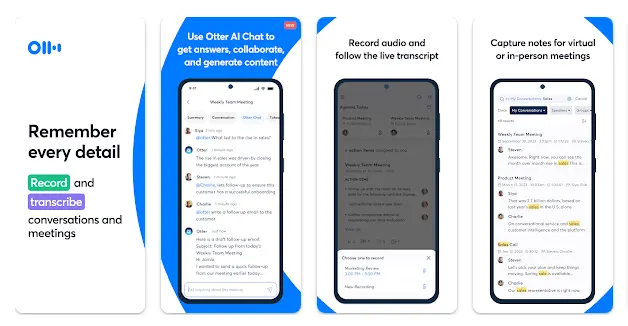
Otter transcribes spoken content in real-time and is a game-changer for professionals, students, and journalists. Taking notes is a breeze because it can recognize different speakers and even comprehend context.
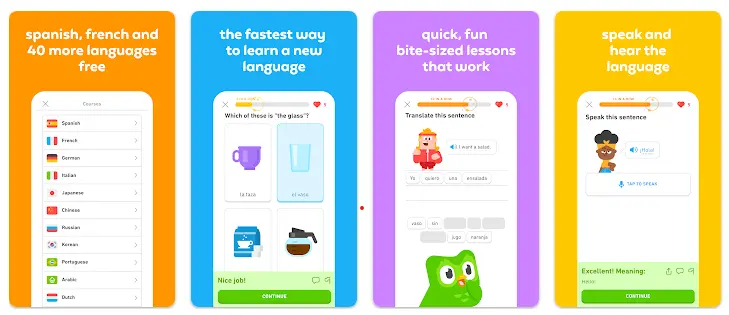
Using artificial intelligence (AI) to customize lesson plans, Duolingo is revolutionizing language learning by allowing users to learn at their own speed and receive exercises based on their level of ability.
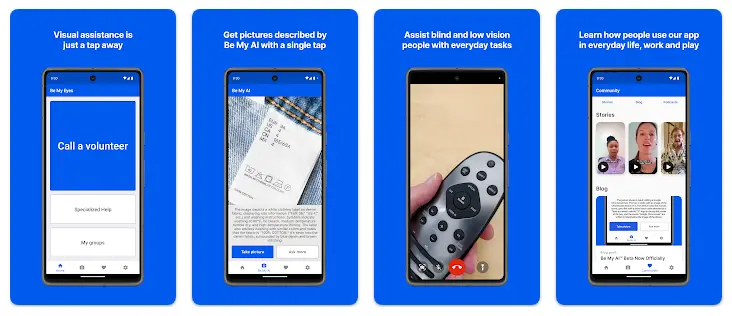
This wonderful app pairs sighted volunteers with visually challenged people. It makes sure that calls are routed to available and multilingual volunteers by using artificial intelligence.
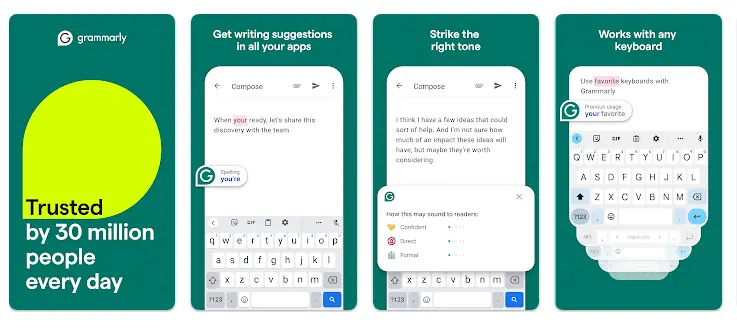
Grammarly is more than simply a spell checker; it use artificial intelligence (AI) to scan text for grammatical mistakes, stylistic inconsistencies, and even tone, guaranteeing that your work is understandable and impactful.
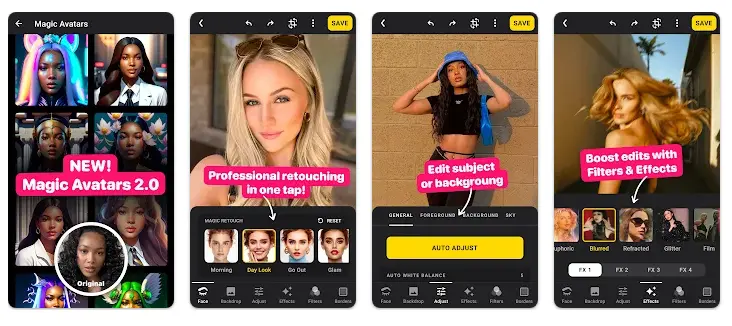
Lensa AI is an AI-powered photography app that improves portraiture. It can automatically make lighting adjustments, edit images, and even recommend the ideal positions.
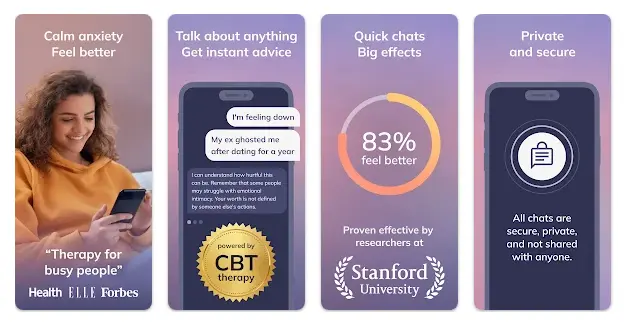
Youper is here to help, and mental wellness is really important. This app helps users understand and control their emotions by using artificial intelligence to lead them through cognitive behavioral therapy sessions.
Prior to AI app development, think of the problems you need to tackle in the market. Think about the procedures and features you want your app to have in order to fully utilize the AI technology stack and achieve the desired outcomes.The next step is to establish your product demands. This requirement analysis will assist developers in understanding the motivation behind product creation and in identifying the appropriate tools and technologies to be assisted.
Apps powered by data-driven AI require enormous volumes of data in order to function as intended. To create the best data model, you must first gather and appropriately prepare data before applying it.The professionals you work with will assist you in analyzing the sources and data gathered so that you may produce labeled data for later usage. If any incompleteness, irrelevant-ness, or errors are discovered, the gathered data is thoroughly cleaned and arranged. Data is deleted if it is not accurate. Since the data quality will be utilized to train the app, which will have a big impact on how well it performs, it is kept at the forefront.
Choosing the appropriate algorithm is a crucial step in developing an AI application. Even though the technical principles could be difficult to grasp, it’s essential to understand the fundamentals in order to choose the best algorithm for the job at hand. In this manner, you may guarantee precise and successful problem-solving while creating a sound AI application.
Once the appropriate method has been selected, accuracy checking is crucial. However, establishing any kind of standard measurements or thresholds will not guarantee model accuracy. Consequently, appropriate training and retraining will validate the algorithm’s capability to function flawlessly up until the anticipated level of accuracy is reached. Since the data is the only thing that determines how well the app works, the data should be diverse enough to support the model’s performance as anticipated.
The ideal way to create AI apps that provide rich experiences is to use the correct AI programming language and tools. There are various tools, languages, and frameworks, accessible in the market with each having its own advantages and disadvantages. You can choose the one that best meets the needs of your AI project.While some AI programming languages are great at natural language programming, others excel at processing massive volumes of data and breaking them down into manageable chunks..
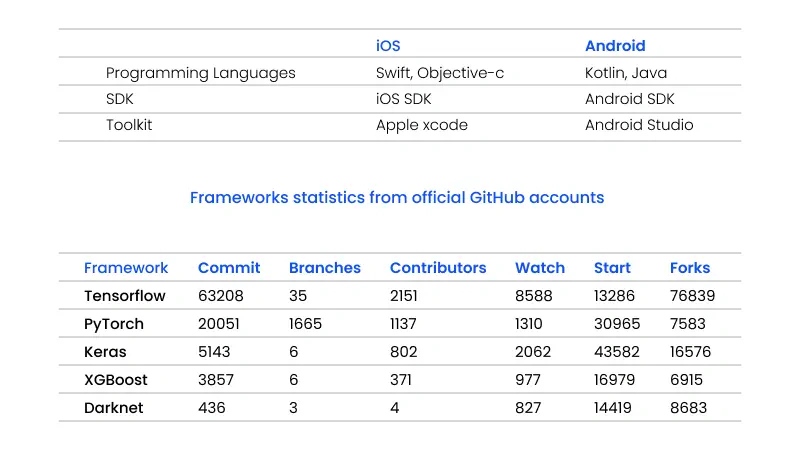
To make the construction of AI apps easier, we often leverage a variety of frameworks and APIs, many of which come with built-in deep learning, NLP, and neural network capabilities. These kinds of qualities make it easier to use off-the-shelf picture, audio, and language recognition systems. Moreover, it provides high-level abstractions of complex machine learning methods.
Creating the app’s architectural design, developing the frontend and backend, and designing the user experience with the target audience in mind are all essential components of developing an AI app. Additionally, you can enhance functionality, optimize efficiency, and check for updates in this particular stage. Since this is one of the most crucial stages, hiring a reliable AI app development services provider is important to avoid long term loss of time, effort, and money.
We’ve already developed the app; now it’s time to include the previously constructed AI model into the same application. We have to make sure that there is no loss during integration because that could result in increased creativity, accuracy, and efficiency.
The model is tested using a fresh data set that is completely new to it along with a variety of manual, automated, or hybrid tools once it has learned to a point of adequate comprehension. This stage, sometimes referred to as validation, is crucial for evaluating the correctness and dependability of the model.Additionally, real-time users evaluate AI apps in beta environments where they navigate the app and offer feedback.
The well-trained and verified model is incorporated into the app after testing. The AI application must now be capable of forecasting or making judgments based on real-time data and have the ability to identify patterns that it has learned throughout training.
After deployment, the support staff takes care of routine maintenance, keeps an eye on the functionality of your AI programs, and gets user input. Additionally, they optimize the app’s efficiency and user experience by making significant upgrades and changes.
It is difficult to determine how much an AI-based app will cost to produce. Naturally, the precise cost will change based on the features and functionalities you wish to add to your app. However, as a general guideline, the budget for AI app development costs between $30,000 and $80,000. This is only an approximate figure, therefore the real cost may vary depending on a number of variables and levels of complexity.
Now let us provide you with a ballpark estimate of the AI budgeting app’s cost based on the complexity levels and give you an update on the timelines.
| AI App Complexity | AI App Development Cost | AI App Development Time |
| Basic Complexity | $10,000 to $20,000 | 3 to 6 Months |
| Medium Complexity | $20,000 to $40,000 | 6 to 9 Months |
| Advanced Complexity | $40,000 to $80,000 | 9+ Months |
Basic Complexity – User registration, account information retrieval, social media integration, search, and settings are examples of low complexity.
Medium Complexity – The elements of the light edition plus an interactive chatbot, notifications, spending tracking, and budget creation make up the medium complexity.
High complexity: Includes multi-media conversation, savings estimation, and all of the aforementioned capabilities.
Konstant Infosolutions is a top AI app development company in India with other offices in USA, UK, and UAE. Throughout the years, the organization has developed cutting-edge AI business solutions for corporations and startups by utilizing its development skills.
Our development team creates business solutions that address real-world problems and has practical experience with cutting-edge AI techniques. Using our domain expertise, our team can quickly take on any AI app development difficulty and create affordable business solutions.
Reasons to Choose Konstant:
So, this was all about AI app development and how to build an AI app in 2024. We have covered every major topic in the article including what is AI, benefits of artificial intelligence for businesses, and the top industries that are leveraging the AI. Apart from this, we have described the process of AI app development, the cost of AI app development, and the top AI apps in the market.
Note that building an app is a time taking and expensive affair and the AI app development service provider plays a significant role in the journey. Therefore, make sure to consider only reliable & top mobile application development company, like Konstant Infosolutions, that carry proven experience & expertise in the industry for best results.
Artificial Intelligence is a computer system that can be taught to carry out tasks that normally require human intelligence. It uses algorithms that simulate how the human brain works to learn and solve problems. There are uses for artificial intelligence in a variety of industries, including commerce, law, academics, and medical.
The cost of AI app development is variable and depends highly on project requirements and AI app development services provider. However, the average price to develop an AI app ranges between $20,000 and $40,000.
The time require to build an AI app is approximately 3-9 months but the exact timeline can estimate after understanding the project requirements. The time depends on the project complexity, hired AI Development Company, tech stack required, number of platforms, and many other factors.
There are several AI apps in the market currently but the most dominant ones are ChatGPT, Grammarly, Otter, Lensa AI, Youper, Replika, and Be My Eyes. A
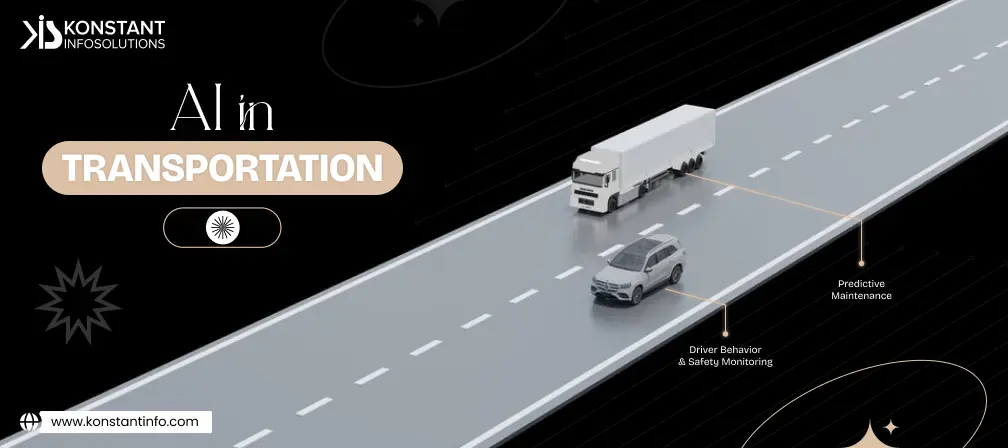
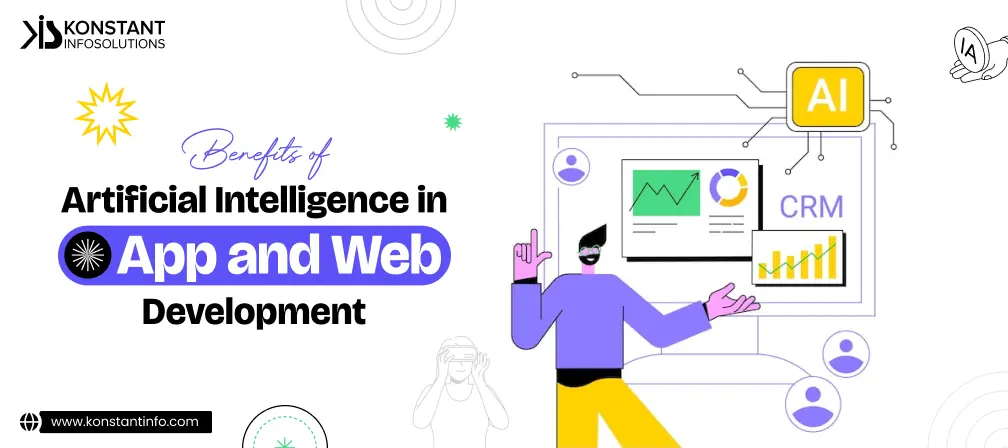
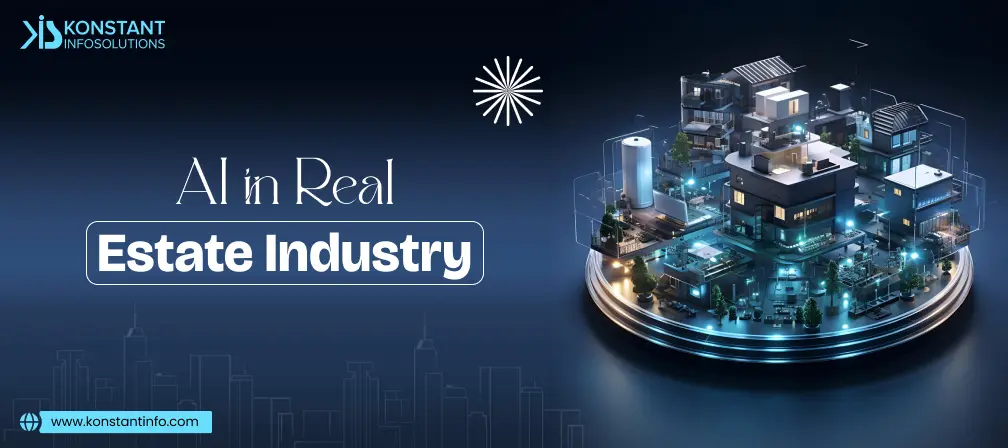
Vipin Jain is the Co-Founder and CEO at Konstant Infosolutions and is in charge of marketing, project management, administration and R&D at the company. With his marketing background, Vipin Jain has developed and honed the company’s vision, corporate structure & initiatives and its goals, and brought the company into the current era of success.
Or send us an email at: [email protected]